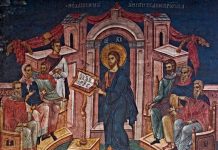It seems that once again Saint Thomas More’s head may be lost. After his beheading on July 6th, 1535, for his refusal to sign the Oath of Supremacy, making Henry VIII ‘Supreme Head of the Church in England’ – basically, making him Pope – More’s head was placed on a pike at the city gates to warn others who would dare defy the king.
His daughter Margaret rescued her father’s head, and it was eventually buried within the church of Saint Dunstan’s in Canterbury (now Protestant), where Margaret and her husband Roper lived. I had the privilege of making an unwitting pilgrimage to the site in my tour through southern England in 2018. As I wandered through the cobbled streets of Canterbury, I noticed the plague commemorating their house, then the church, then the plaque within the church signifying where More’s head resided.
Now the relic is in such a state of deterioration that it needs to be exhumed and properly sealed. I wonder if the Anglicans will permit such? It seems not, as the article quotes:
Church warden Susan Palmer told the Register that “the overriding feeling” at their meeting “was that we should be concentrating our efforts and finances in caring for our community and upgrading our building with better lighting, sound etc. that would enrich the experience of all our visitors, whether pilgrims, casual visitors or congregation
Ah, better lighting and sound, the aim and mission of the ecclesia moderna.
Whatever happens to his earthly head, Saint Thomas More remains a shining example of fidelity and courage, standing alone against the depredations of a depraved king.
We will leave you with the words of Chesterton from the same article, which are, as usual, prophetic:
G.K. Chesterton remarked on his importance in the face of modernism, noting in 1929, six years before his canonization, that Thomas More “is important today, but he is not as important now as he will be in 100 years from today.” In a column for the Register in 2015, Stephanie Mann wrote that “we haven’t reached the centennial of Chesterton’s prediction, but it has already come true.”









